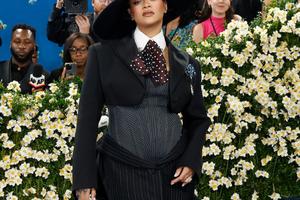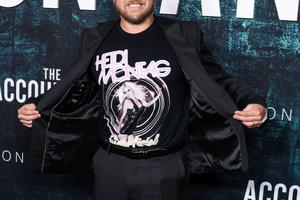Entertainment
/ArcaMax

Rihanna: I've always wanted a baby girl
Rihanna has "always wanted" a baby girl.
The 37-year-old star is currently pregnant with her third child, and after previously having two baby boys with A$AP Rocky, Rihanna admits that she'd love to have a little girl one day.
Asked about the sex of her unborn baby, Rihanna told Extra: "You have to wait and see. Oh, my gosh, are you guys going...Read more

Mutual support is key to a happy marriage, says Rita Ora
Rita Ora thinks mutual support is the key to her marriage to Taika Waititi.
The 34-year-old pop star has been married to the Hollywood director since 2022, and she's now explained why their relationship works so well.
The chart-topping singer told People: "I think just respect and supporting each other through our own separate careers, ...Read more

Sarah Jessica Parker doesn't watch And Just Like That...
Sarah Jessica Parker refuses to watch And Just Like That...
The 60-year-old actress reprised the role of Carrie Bradshaw to star in the Sex and The City sequel series - but Sarah doesn't enjoy watching herself on-screen.
During an appearance on Watch What Happens Live With Andy Cohen, Sarah explained: "I don't not watch it because I'm being ...Read more

Stellan Skarsgard accepted a lower salary for Sentimental Value
Stellan Skarsgard accepted a lower salary for Sentimental Value because he wanted the crew to enjoy good lunches.
The 74-year-old actor served as an executive producer on the Joachim Trier-directed comedy-drama film, but Stellan decided to accept a lower salary for his role for the sake of the crew.
During a round-table interview at the ...Read more

Rihanna thrilled to see Smurfs movie being 'birthed'
Rihanna is thrilled that Smurfs is "finally being birthed".
The 37-year-old star voices the part of Smurfette in the new animated movie, and Rihanna is delighted that her kids can now finally enjoy the movie.
The chart-topping singer - who has RZA, three, and Riot, 23 months, with A$AP Rocky - told Extra: "We get to watch the movie together ...Read more

Olivia Culpo and husband Christian McCaffrey's baby has arrived: 'Love like no other'
Olivia Culpo and Christian McCaffrey are now parents, and the arrival of their baby girl has them both feeling lucky.
Model-actor Culpo revealed Sunday that she and her NFL star husband welcomed their daughter earlier this month. She marked the beginning of her journey into motherhood on Instagram, sharing several pictures from her newborn’s ...Read more

'Jaws' star Richard Dreyfuss cancels SharkCon appearance amid severe illness
“Jaws” star Richard Dreyfuss dropped out of an appearance at a fan convention over the weekend after coming down with viral bronchitis that appeared to require hospitalization.
The 77-year-old actor was expected at SharkCon, an event hosted by National Geographic in Tampa, that took place July 12 and 13.
In a video posted on the SharkCon ...Read more

Review: Bad Bunny urges Puerto Ricans to own their rhythm in emotional hometown show
A young woman emerged from the dark into a green and bushy clearing. Under the faux moonlight, she wandered the stage, speaking to herself. “Where’s my camera? I can’t believe I lost it. All my memories were there,” she said with a pang of panic in her voice.
Moments later, a young man surfaced from the same spot. His eyes scanned the ...Read more

Rachel Scott and James Longman will co-anchor a daily ABC News streaming program for Disney +
The news is coming to Disney +.
Starting July 21, the streaming service will offer its first original program from ABC News with senior political correspondent Rachel Scott and international correspondent James Longman as co-anchors.
The short-form program, called “What You Need To Know,” will be taped each morning and made available to ...Read more

Rosie O'Donnell: I'm everything 'King Joffrey' Donald Trump fears
SAN JOSE, Calif. — Touching on their increasingly incendiary public feud, comedian Rosie O’Donnell explained over the weekend why Donald Trump, the president of the United States, is giving any thought to her, a past-her-prime entertainer who no longer lives in the United States.
“I am proud to be opposed to every single thing he says and...Read more

Richard Johnson: TV show that lets scandalized celebrities tell their side is in the works
“Canceled” is ready for its closeup.
A TV show is in post-production that will give celebrities who have had career setbacks amid various scandals a chance to defend themselves.
The show’s creator Matt Karol told me, “We have a lot of interest from people who want to go public and explain what happened.”
Chris Hansen, who appears in...Read more

Review: Stephen King's 'The Institute' miniseries sets gifted children against nefarious adults
"The Institute," a 2019 novel by Stephen King, Maine's Master of the Macabre — or horror, I just said macabre for the alliteration — has become a miniseries with some major additions and minor emendations. The series, which premiered Sunday on MGM+, belongs to a popular genre in which superpowerful young 'uns are gathered in some sort of ...Read more

Review: Blackpink pumps up the SoFi crowd with first US show in 2 years
LOS ANGELES — Blackpink is back in the U.S.
The K-pop girl group, made up of Rosé, Lisa, Jennie and Jisoo, triumphantly kicked off the North American leg of the Deadline world tour Saturday night at SoFi Stadium in Inglewood. After a two-year break to focus on solo projects, the group reunited for its first U.S. concert since the Born Pink ...Read more

2025 Emmy nominations predictions: Our expert's picks in 15 major categories
Emmy nominations arrive Tuesday, and there will be plenty of time for us to argue about who should win (let's start with "The Pitt") and why this could be the year (though probably not) that we'll have a surprise or two when the trophies are handed out on Sept. 14.
In the meantime, if you love "Severance," "The White Lotus," "The Pitt," "The ...Read more

Commentary: 'Superman' isn't superwoke. Why the backlash is overblown
In James Gunn's "Superman," the titular superhero is devastated when he learns that his birth parents sent him to Earth to subjugate humanity.
In theaters now, the film is set a few years into Superman's caped career. The Kryptonian — who grew up as Clark Kent on a farm in Smallville, Kansas — always believed a message left to him by these ...Read more

America's Got Talent'/'American Idol' alum Jessica Sanchez is back: 'I know who I am'
SAN DIEGO — Jessica Sanchez is all grown up.
Only 10 when she competed on the first season of “America’s Got Talent” in 2006 and 16 when she came in second on “American Idol” in 2012, the big-voiced San Diego native is now 29, married and pregnant with her first child. More importantly, after taking a big step away from the ...Read more

Spencer Pratt explains why he missed Brody Jenner's wedding
Spencer Pratt missed Brody Jenner's wedding due to a diary clash.
The two stars have been friends since they were 13 years old but Spencer and his wife Heidi Montag were notably not in attendance when his pal tied the knot with Tia Blanco in Malibu on Saturday (12.07.25).
Spencer was asked on TikTok why he hadn't been at Brody's celebration ...Read more

Justin Baldoni's legal team hit back at 'foot-stomping' Blake Lively
Justin Baldoni's legal team have blasted Blake Lively's "foot-stomping and use of her celebrity status".
The former Gossip Girl star is suing her It Ends With Us co-star and director for sexual harassment and retaliation and after she filed a motion requesting her deposition takes place in her own lawyer's office to prevent potential paparazzi ...Read more

YouTuber Michelle Khare's latest challenge? To win an Emmy
LOS ANGELES — Michelle Khare has mastered taekwondo, muscled through police academy and conquered Houdini's deadliest trick. But now comes a different kind of challenge for the popular daredevil: proving to the Hollywood establishment that Emmy-worthy content arises from YouTube.
The host, known for her online reality series "Challenge ...Read more

How to watch the 2025 Emmy nominations and what else you need to know
July signals summer fun, Independence Day and ... Emmy nominations.
Nominations for TV's biggest awards show will be announced Tuesday. This year's field of small-screen offerings includes returning favorites like HBO's "The White Lotus" and breakout hits such as Apple TV+'s "The Studio."
Here is everything you need to know about this year's ...Read more











